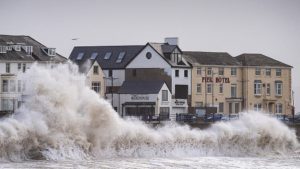On February 15, German Chancellor Olaf Scholz met with Russian President Vladimir Putin on his first visit to Moscow since he was elected in December. Prior to the meeting, the Chancellor declined a PCR test by Russian medical staff. Instead, a medical professional from the German embassy tested the Chancellor upon his arrival. In line with Covid protocol, Scholz and Putin sat at opposite ends of a six-meter-long table to begin talks about the Ukraine crisis.
Russia has amassed up to 190,000 troops close to the Ukrainian border, and the Ukrainian military is training civilians for a potential Russian invasion. However, the Kremlin continues to deny any plans of military attack, despite recent increases in Russian shelling. Putin has long been dissatisfied with Ukraine’s move towards the EU and NATO.
After four hours of discussion, Scholz and Putin attended the joint press conference. Scholz had called upon Russia to move towards a de-escalation of the crisis, intending to use dialogue as the primary means to maintain peace in Europe. Putin asserted that Russia “[does not] want war in Europe.”
Another topic was the future of the controversial Nord Stream 2, a gas pipeline that provides Germany with Russian gas. The pipeline passes through Ukrainian territory and would give Germany energy security. Putin stated that “German citizens should thank Mr. Schröder”, Germany’s ex-Chancellor, who initiated the basis for the gas pipeline between the two nations in the mid-1990s. Scholz has evaded questions regarding the project if war were to occur.
This German hesitance was felt strongly by Ukraine, with Kyiv’s mayor rejecting Berlin’s aid package of 5,000 protective helmets. On January 26, he described it as a “joke”, compared to what other European countries have given Ukraine.
At the annual Munich Security Conference on February 18, world leaders gathered in Germany. For the first time in years, the Russian delegation did not attend. On the second day of the conference, Scholz stated that “Europe is threatened by war once again.” For now, it seems that diplomatic relations between Germany and Russia will be maintained through dialogue. What the future looks like for Europe will soon be revealed.






